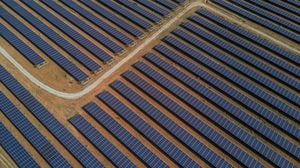Ukraine is making headlines again as its Kursk operation, which began on August 6, 2024, continues to shock and reshape the geopolitical battlefield, particularly the strategic interests of non-western countries like China and India. This unexpected surge of Ukrainian military action deep inside Russian territory is creating ripples far beyond the immediate conflict, prompting discussions about peace negotiations.
Backed by its allies, Ukraine's tactics have shifted dramatically following its advances. Previously viewed solely as the victim of Russian aggression, Ukraine is now altering the narrative. The situation has escalated to the point where Ukraine is operating on Russian soil, leading to new negotiations about potential resolutions to the conflict.
China, for example, is weighing the impact of Ukraine's penetration of Russian territory. For Beijing, advocating for peace talks between Moscow and Kyiv carries considerable weight, especially if it can leverage this situation to bolster its influence over both parties. A growing sense of urgency surrounds calls for ceasefires and negotiations, emphasizing the need for Russia and Ukraine to seek accommodation after this deep incursion.
Historically, Ukraine has faced challenging negotiations, often under duress from Russia. Previous agreements, like the Minsk Accords, favored Moscow, leaving Kyiv feeling cornered. Many observers question whether stability could ever truly be achieved under such inequitable terms. Now, with Kyiv's military position gaining strength, it has the potential to negotiate from a point of newfound leverage.
Before the Kursk operation, Ukraine often found itself negotiating under unfavorable circumstances. The earlier Minsk agreements were laden with compromises, effectively turning them from hard-fought peace attempts to agreements made at gunpoint. The previous format of deals like Minsk-I and Minsk-II had led to unrealistic conditions for Ukraine, by making them reliant on approval from Moscow's proxy forces. A stark change has taken place, as Ukraine is more capable of asserting its demands against Russia.
Interestingly, the renewed military engagement has shifted the conversation around international support. The West remains firmly behind Ukraine, but the dynamic is shifting for non-western nations. Key players like Brazil and India are reevaluated their positions. With Ukraine’s recent successive successes, these countries now view potential discussions over territorial exchanges as plausible resolutions.
The concept of “land for land” could serve as the basis for new negotiations between Ukraine and Russia, offering the latter the chance to regain its territory and allowing Ukraine to retrieve its land occupied since 2014. This move could break through the previously rigid frameworks of talks.
Germany's recent consideration of emergency measures, such as constructing new bunkers for civilians, reinforces the notion of growing fear and urgency across Europe. Russia’s hybrid warfare strategy includes threats not just to Ukraine but extending its malign activities to disrupt the stability of Western nations. Analysts have noted the long-lasting damage to the UK stemming from this kind of warfare, including cyberattacks and the undermining of public trust.
On another front, military readiness is being heightened. The United Kingdom has recently ramped up its sanctions against Russia targeting its vast shadow fleet. This includes significant measures against nearly 30 ships tied to Russian efforts, highlighting the containment strategy turned proactive rather than merely reactive.
The hybrid warfare tactics employed by Russia, as experts note, are multifaceted and focus on combining military operations with strategic subterfuge aimed at crippling the West's resolve and unity. This complexity complicates how nations approach their own defense strategies. The UK, for example, views the latest Ukrainian operations and potential escalations from Russia as prompting necessary protective measures.
With President Biden's administration committed to supporting Ukraine, questions loom about future strategies surrounding the conflict as Donald Trump approaches another presidential term, potentially bringing changes to the geopolitical order. Many world leaders remain wary of Trump, as his returns could impact their existing alliances and provoke shifts in international relations. This uncertainty influences how countries like China strategize their responses on global platforms.
The recent incursions by Ukraine initiated to shift the power dynamic highlight the need for sustained military strategies and diplomatic messages. Before or post each pivotal meeting, fronts will pivot around talk of how each nation positions itself against the backdrop of such warlike tension. It remains to be seen whether these advances will bring forth tangible negotiations or merely increase hostilities.
Russia faces the challenge of not only validating its military incursions but also preserving its domestic credibility. Increasingly, the possibility of withdrawing from some Russian territories could serve as a way to regain legitimacy among the Russian populace and elite. If Ukraine can maintain its newfound foothold, the idea of negotiating land exchanges won’t appear so far-fetched.
At the same time, the cost of the current Russian occupation, compounded with potential loss of areas considered legitimate parts of Russia, puts pressure on the Kremlin, possibly enticing negotiations for returning to previously secured territories. For many, the idea of exchanging occupied territory for Moscow's security, has begun to gain traction.
While global observers are closely watching developments, Russia’s potential for escalation remains palpable. The looming presence of nuclear weapons shadows negotiations much like the conflicts preceding them. Any perceived weakness may incentivize Ukraine and others to push forward, potentially inciting reaction from Russia.
Currently, the focus is on solidifying potential international alliances and ensuring the continuity of those initiatives. Prominent discussions on potential settlements will occur with parties like China poised to demand accountability from both Ukraine and Russia’s leadership. Through these engagements, there exists the risk of tightening the already complex web of international relationships.
Efforts to clarify the nature of each country's stakes are imperative now as nations look to navigate the tumultuous seas of change. Non-western nations are urged to rethink past alliances and commitments, seeking to adapt to the rapidly altering geopolitical climate.
Moving past mere rhetoric, the stakes involved necessitate more open discussions around peace talks. The recent shifts presented whether through Ukraine’s decisive offensive or Russia’s reactionary measures—highlight both the fragility and dynamism of international diplomacy as the whole world watches with bated breath.



